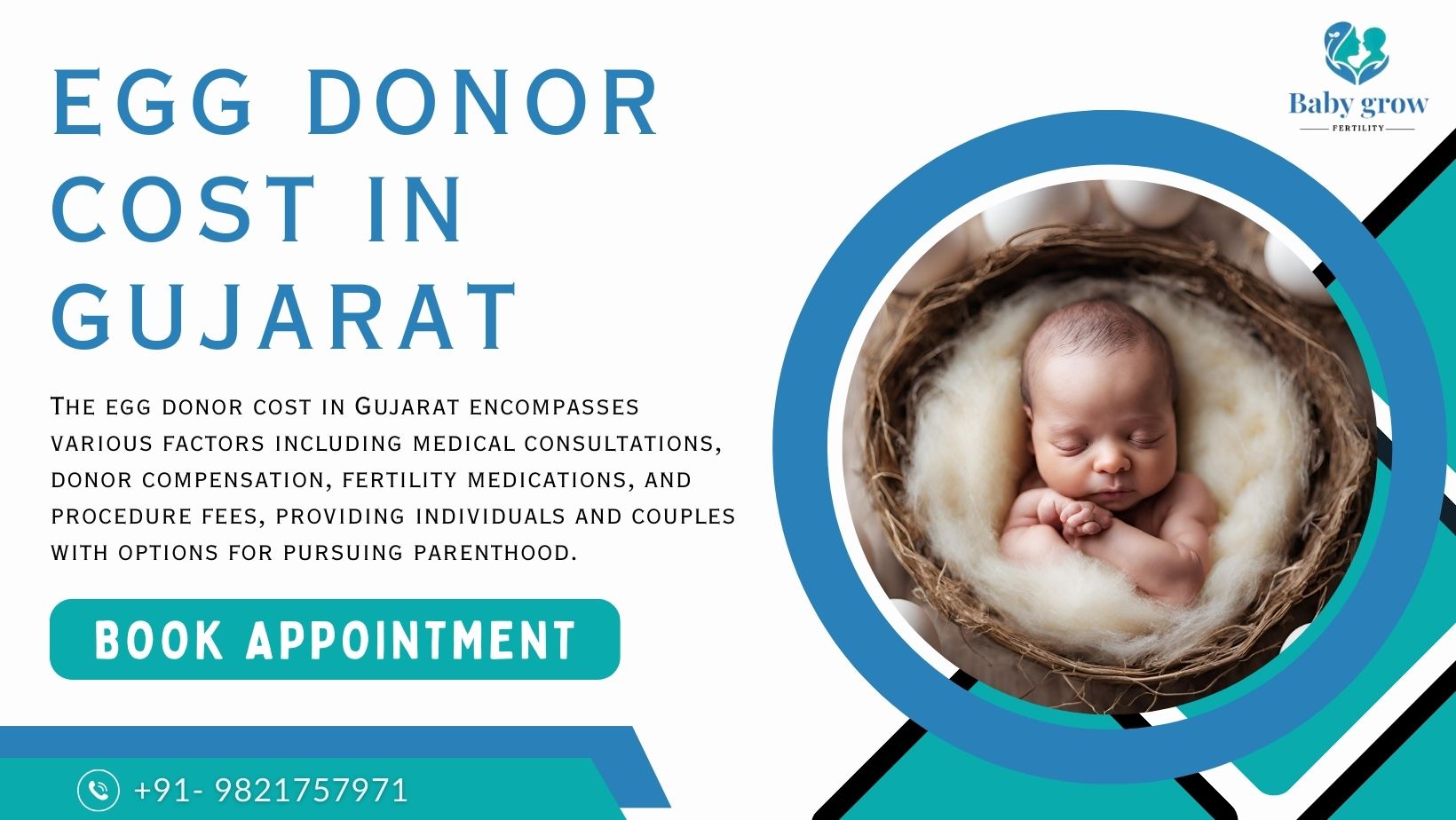Welcome to Baby Grow Fertility, where we understand the significance of assisted reproductive techniques in fulfilling the dreams of parenthood. In our quest to provide comprehensive fertility solutions, we delve into the nuanced realm of egg donation, focusing today on the intricacies of Egg Donor Cost in Gujarat.
As a leading fertility center in Gujarat, we recognize the importance of transparency and informed decision-making when it comes to embarking on the journey of egg donation. In this informative guide, we shed light on the various factors that contribute to the cost of egg donation in Gujarat.
From clinic fees to donor compensation, legal considerations to medical expenses, we aim to equip you with the knowledge needed to navigate this aspect of fertility treatment confidently. Whether you’re a prospective egg donor or a hopeful recipient, understanding the financial implications of egg donation is crucial.
Join us as we explore the landscape of egg donor cost in Gujarat, empowering you to make informed choices on your path to parenthood.
What is Egg Donation?
Egg donation is a fertility treatment option where a woman, known as the egg donor, provides her eggs to be used by another individual or couple, known as the intended parents, who are unable to conceive using their own eggs. This process involves retrieving eggs from the donor’s ovaries, fertilizing them with sperm in a laboratory, and transferring resulting embryos to the uterus of the intended mother or a surrogate.
Why do people opt for egg donation?
People choose egg donation for various reasons, primarily when they are unable to produce viable eggs for conception due to factors such as advanced maternal age, genetic conditions, or medical treatments like chemotherapy. Egg donation offers hope to individuals and couples struggling with infertility, allowing them to experience pregnancy and parenthood despite their own reproductive challenges. It provides an opportunity for individuals who may have exhausted other fertility treatment options, such as in vitro fertilization (IVF) using their own eggs, or for those with a high risk of passing on genetic disorders to their offspring. Additionally, same-sex male couples and single individuals may opt for egg donation to build their families. Overall, egg donation provides a pathway to parenthood for those facing obstacles in conceiving with their own eggs, offering a chance to fulfill their dreams of having a child.
Brief Overview of Egg Donation Process
Brief Overview of Egg Donation Process:-
- Initial Consultation: The process begins with an initial consultation with a fertility specialist where the intended parents discuss their options and understand the egg donation process.
- Matching Process: Once the decision to proceed with egg donation is made, the intended parents are matched with a suitable egg donor. This matching process involves consideration of various factors such as physical characteristics, medical history, and personal preferences.
- Medical and Psychological Evaluation: The selected egg donor undergoes thorough medical and psychological evaluations to ensure she is in good health and mentally prepared for the donation process. This evaluation typically includes screening for infectious diseases, genetic disorders, and psychological assessments.
- Ovarian Stimulation: The egg donor undergoes ovarian stimulation using hormone medications to encourage the development of multiple eggs within her ovaries. This process usually takes around 10-14 days and involves regular monitoring through blood tests and ultrasound examinations.
- Egg Retrieval: Once the eggs have reached optimal maturity, they are retrieved from the donor’s ovaries through a minimally invasive surgical procedure called follicular aspiration. This procedure is performed under sedation or anesthesia and involves using a needle to extract the eggs from the ovarian follicles.
- Fertilization and Embryo Development: The retrieved eggs are then fertilized with sperm from either the intended father or a sperm donor in a laboratory setting. After fertilization, the resulting embryos are cultured and monitored for several days to assess their quality and development potential.
- Embryo Transfer: The final step of the egg donation process involves transferring one or more embryos into the uterus of the intended mother or a gestational surrogate. This procedure is usually performed using a thin catheter inserted through the cervix, and it aims to facilitate implantation and the establishment of pregnancy.
Throughout the entire egg donation process, close coordination between the fertility clinic, egg donor, and intended parents is essential to ensure a safe and successful outcome. Additionally, emotional support and counseling are often provided to all parties involved to address any concerns or challenges that may arise during the process.
Factors influencing egg donor costs
Demand and Supply: The balance between the number of intended parents seeking egg donors and the availability of willing donors can significantly impact costs. Higher demand for specific traits or characteristics in donors may drive up prices.
Donor Characteristics: Certain attributes of the egg donor, such as age, ethnicity, education level, and prior donation history, can influence the cost. Donors with desirable characteristics may command higher compensation.
Geographical Location: Costs can vary depending on the region or country where the egg donation takes place. Urban areas or regions with higher living expenses may have higher overall costs for egg donation services.
Medical Complexity: The complexity of the egg donation process, including any additional medical procedures or treatments required, can affect costs. For example, donors who require more extensive medical interventions or screening may incur higher expenses.
Clinic Reputation and Success Rates: Established clinics with higher success rates and positive reputations may charge higher fees for their services. Intended parents may be willing to pay more for the assurance of quality care and better chances of success.
Egg Donor Cost in Gujarat
In Gujarat, the cost of egg donation at Baby Grow Fertility typically ranges from INR 80,000 to INR 150,000. This fee encompasses various aspects of the process, including clinic fees, donor compensation, medical evaluations, and legal expenses. Our transparent pricing structure ensures that prospective egg donors and recipients have a clear understanding of the financial commitments involved in the journey of egg donation. At Baby Grow Fertility, we prioritize affordability without compromising on the quality of care and support provided to our patients. With our experienced team and state-of-the-art facilities, we strive to make the process of egg donation accessible and seamless for individuals and couples seeking to expand their families through assisted reproductive techniques.
Breakdown of expenses involved in egg donation
Sure, here’s a breakdown of expenses involved in egg donation:-
- Medical Procedures: This includes the cost of medications used to stimulate the egg donor’s ovaries, monitoring appointments to track follicle development, and the egg retrieval procedure itself.
- Screening and Evaluation: Expenses related to the comprehensive screening and evaluation process for both the egg donor and intended parents. This may involve medical tests, genetic counseling, and psychological assessments to ensure suitability for the procedure.
- Legal Fees: Costs associated with legal services to draft contracts, establish parental rights, and address any legal matters related to egg donation. Legal fees ensure that all parties involved are protected and aware of their rights and responsibilities.
- Compensation for Egg Donor: Egg donors are typically compensated for their time, effort, and any inconvenience associated with the donation process. The amount of compensation can vary based on factors such as the donor’s characteristics, previous donation history, and the demand for donors.
- Additional Expenses: These may include travel expenses for the egg donor if they need to travel to the fertility clinic, accommodation costs, and any other miscellaneous expenses incurred throughout the egg donation process.
What is the Success Rate of egg donor in Gujarat?
The success rate of egg donation in Gujarat is a topic of interest for individuals and couples exploring fertility treatment options. According to available data, the success rate of egg donation can vary significantly from traditional IVF procedures. While the average pregnancy rate achieved for an IVF cycle using the patient’s own eggs ranges from 35% to 43%, the success rate per IVF cycle with egg donation can increase notably to approximately 55% to 63%. This increase in success rate underscores the importance of considering egg donation as a viable option for those facing challenges with conception. Understanding these statistics can help individuals make informed decisions and navigate the journey of fertility treatment with confidence in Gujarat.
Conclusion
In conclusion, navigating the landscape of egg donor cost in Gujarat requires a comprehensive understanding of the various factors involved, including clinic fees, donor compensation, medical evaluations, and legal considerations. At Baby Grow Fertility, we are committed to providing transparent information and support to individuals and couples embarking on the journey of egg donation. Our dedicated team ensures that every step of the process is handled with care and professionalism, empowering our patients to make informed decisions on their path to parenthood. With our expertise and compassionate approach, we strive to make the dream of building a family a reality for all those who seek our assistance.
Frequently Asked Questions:-
Q1. What does an egg donor do?
Ans: Egg donation is a process when one person (donor) provides eggs to another. The person who accepts the donation (recipient) uses the eggs to conceive a baby and may be a surrogate, carrying the baby for another person or persons, or may intend to parent the baby.
Q2. Are donor eggs your baby?
Ans: Those who are thinking about using donor eggs may be curious about whether any children born from those eggs will have their DNA. Any embryo created from a donor egg will contain the egg donor’s DNA since every embryo has DNA from both the egg and the sperm in equal amounts.
Q3. How many eggs can a woman donate?
Ans: You may donate eggs up to six times in your life, which is the limit set by the American Society for Reproductive Medicine. This means that you can donate between 60 and 120 eggs in total. Read our guide on how to donate multiple eggs for more information on multiple donation cycles.
Q4. Can your body reject donor eggs?
Ans: In such cases, even though the embryos used are of optimal quality, your body may “reject”—as you said – the embryos, something that indeed prevents embryo implantation and may lead to miscarriage.
Q5. Can you get pregnant with donated eggs?
Ans: Conceiving with egg donation is an option for women who otherwise would not be able to have a baby. Because the eggs used in oocyte donation are usually from young, healthy donors, pregnancy rates are extremely high, exceeding those of all other fertility therapies available.
Q6. How Painful is egg retrieval?
Ans: What to Expect During an Egg Retrieval? During egg retrieval, patients are given pain medication and a sedative in order to make the procedure almost completely free of discomfort. After it is normal to experience some mild side effects such as cramping, bloating, or feelings of pressure.
Q7. Is IVF possible with donor eggs?
Ans: While the average pregnancy rate achieved for an IVF cycle with the patient’s eggs is around 35-43%, the rate can increase to approximately 55-63% success per IVF cycle with egg donation. The variations depend on the receptivity of the uterus.




